Embarking on a journey through the lush tea estates of Darjeeling and Assam is an enchanting experience that transports travelers to a world of breathtaking landscapes, rich cultural heritage, and the aromatic allure of tea.
This exploration promises an immersive adventure through the verdant plantations, unveiling the secrets behind the cultivation of some of the finest teas in the world.
India’s two iconic tea producing regions, Darjeeling and Assam, have not just earned global acclaim for their aromatic brews but also offer immersive cultural and natural experiences.
To truly savor the heart of India’s tea culture, a tour through these historic tea estates is an absolute must.
Table of Contents
Darjeeling: The Champagne of Teas
Clinging to the foot of the mighty Himalayas in West Bengal, Darjeeling’s tea gardens are a sight to behold.
These tea estates are uniquely perched on the steep slopes, shrouded in mist and drenched in hues of emerald green.
The terraced fields interspersed with colorful blossoms and the backdrop of snow-capped mountains make for a picturesque landscape that’s unforgettable.
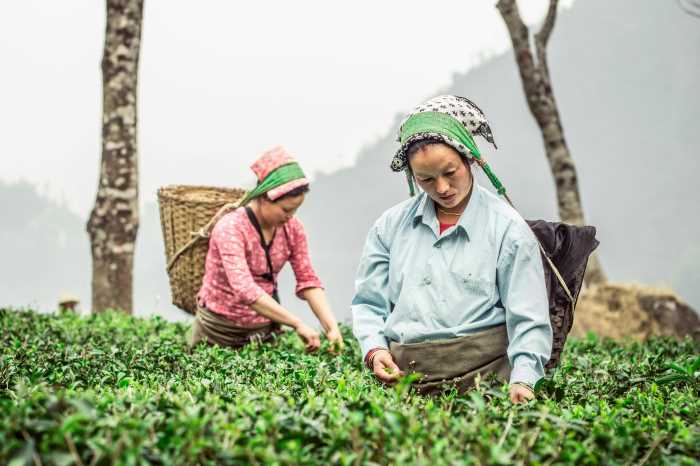
Tea Estates to Visit
Happy Valley Tea Estate: One of the oldest tea plantations in the region, dating back to 1854, Happy Valley is an essential stop.
Visitors can tour the estate, witness the tea plucking process, and learn about the journey of tea leaves from the field to your cup.
Makaibari Tea Estate: Home to the world’s first tea factory, Makaibari is an eco-friendly, organic estate that has retained its traditional farming methods.
Here, visitors can stay in charming bungalows, roam the plantation under the guidance of tea-pluckers, and taste the distinctive muscatel flavor of Darjeeling tea.
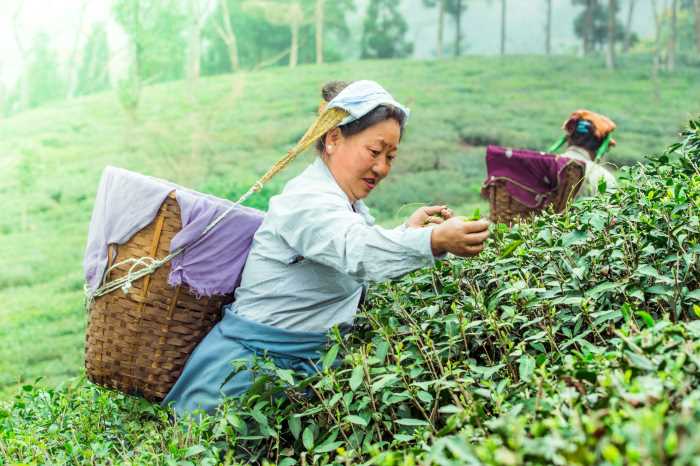
Assam: The Land of Bold, Bright Brews
Assam is the world’s largest tea-producing region, located in the northeast of India.
Known for its full-bodied, brisk, and malty teas, Assam offers a stark contrast to Darjeeling’s subtle, aromatic brews.
The tea gardens are beautifully set in the lush plains, with the majestic Brahmaputra River flowing nearby, offering a vastly different panorama compared to Darjeeling’s steep terrain.
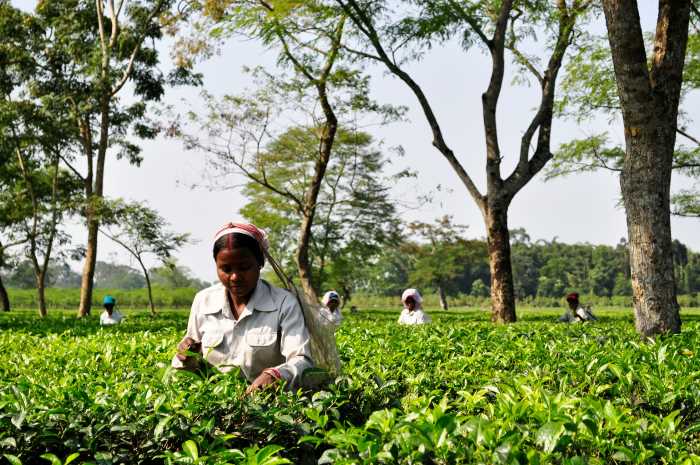
Tea Estates to Visit
Jorhat Tea Bungalows: The tea estates around Jorhat offer splendid stays in colonial-era bungalows that take you back in time.
The sprawling estates and grand bungalows like the Gatoonga and Sangsua Tea Estates are luxurious stays where you can experience tea picking and even attend a tea tasting session.
Kaziranga Golf Resort: A unique blend of golf and tea tourism, this resort is located in the midst of a sprawling tea estate.
Aside from savoring the full-bodied Assam tea, guests can also enjoy a round of golf in one of the most scenic courses in the world.
Tea Festivals
Time your visit to coincide with the tea festivals in both regions to get a deeper understanding of the culture surrounding tea.
The Darjeeling Tea Festival, held in December, is an extravagant celebration featuring tea tasting sessions, cultural performances, and local gastronomic delights.
Assam Tea Festival, celebrated in November, offers tea garden visits, golfing, river cruises, and a chance to witness traditional Assamese dance and music.
A journey through the tea estates of Darjeeling and Assam is not just about tasting world-renowned teas, but also about soaking in the serene natural beauty, experiencing the local culture, and learning about the fascinating process of tea production.
It’s a trip that’s sure to leave you with warm memories and a newfound appreciation for your daily cup of tea.
Darjeeling: The Queen of Hills
- Serenity in the Himalayan Mist: The journey begins in Darjeeling, often referred to as the “Queen of Hills.” Nestled in the Himalayan foothills, this region boasts mesmerizing vistas of rolling hills covered in vibrant green tea bushes. The misty atmosphere adds a touch of mystique to the landscape, creating a dreamlike ambiance.
- Cultural Marvels: As you traverse the tea estates, you’ll encounter the diverse cultures that call Darjeeling home. The warm hospitality of the local communities and their unique traditions contribute to the overall charm of the journey. Take time to explore monasteries, interact with locals, and partake in traditional tea ceremonies to fully appreciate the cultural tapestry.
- Tea Gardens Unveiled: Darjeeling is renowned for its high-quality tea, celebrated for its delicate aroma and distinct flavor profile. Visit iconic tea gardens such as Makaibari and Glenburn to witness the meticulous process of tea cultivation, from plucking the leaves to the intricate art of tea processing.
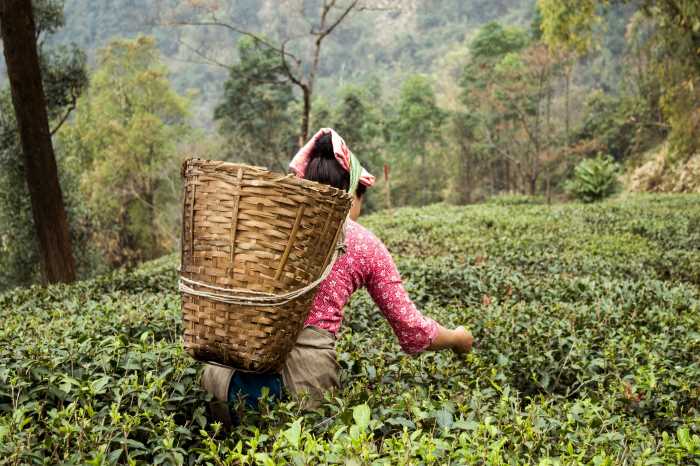
Assam: Where Tea Blooms in Abundance
- Vast Estates and Assamese Charm: The journey continues to Assam, a land where tea blooms abundantly. The vast tea estates in Assam are a sight to behold, stretching as far as the eye can see. The local charm of Assamese hospitality adds a delightful touch to the experience, creating a harmonious blend of nature and culture.
- Wildlife Encounters: Assam’s tea estates are not only a haven for tea enthusiasts but also for wildlife enthusiasts. Many estates are situated in close proximity to national parks and wildlife sanctuaries, providing opportunities to spot diverse flora and fauna. Elephant safaris and bird watching expeditions offer a unique perspective on the region’s biodiversity.
- Legacy of Assam Tea: Assam is synonymous with robust, malty teas that have a distinct boldness. Explore the heritage of Assam tea by visiting estates like Manas and Hathikuli, where you can witness the traditional methods of tea production that have been passed down through generations.
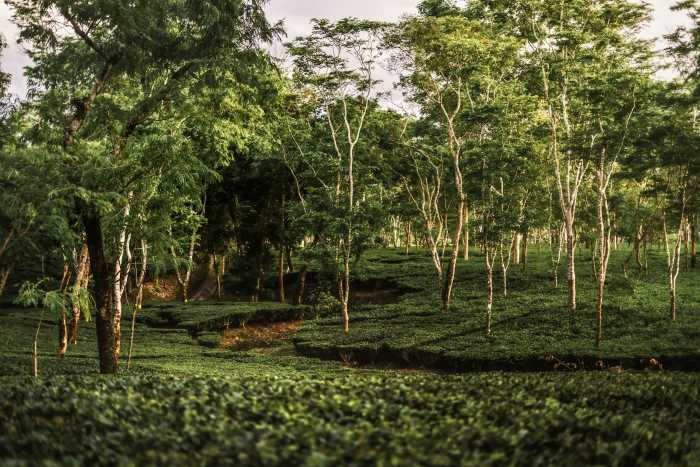
Conclusion: A Tea Lover’s Paradise
In conclusion, the journey through the verdant tea estates of Darjeeling and Assam is a sensory delight that combines natural beauty, cultural richness, and the unparalleled joy of savoring world-class teas.
This expedition offers a profound understanding of the artistry behind tea cultivation and leaves indelible memories of a truly immersive adventure in the heart of tea country.
Whether you’re a tea enthusiast, nature lover, or cultural explorer, this journey promises an unforgettable experience in two of India’s most iconic tea-producing regions.
Frequently Asked Questions (FAQs) – Darjeeling and Assam
1. What makes the tea estates of Darjeeling and Assam special?
The tea estates of Darjeeling and Assam are renowned for producing some of the finest teas globally, each with its unique characteristics. Darjeeling is celebrated for its delicate aroma and flavor, while Assam is known for its robust, malty teas.
2. How do I plan a visit to the tea estates in Darjeeling and Assam?
Start by researching specific tea estates you’d like to visit and plan your itinerary accordingly. Consider factors such as transportation, accommodation, and guided tours. Many estates offer guided tours that provide insights into the tea-making process.
3. What is the best time to visit these tea estates?
The ideal time to visit Darjeeling is during the second flush season (May to June), while Assam is best explored during the plucking seasons from March to November. However, both regions offer picturesque landscapes year-round.
4. Can I participate in tea-tasting sessions during my visit?
Yes, most tea estates in Darjeeling and Assam offer tea-tasting sessions where visitors can sample a variety of teas. It’s a unique opportunity to learn about the nuances of different teas and appreciate the craftsmanship behind each cup.
5. Are there cultural experiences to explore in these regions?
Absolutely. Both Darjeeling and Assam have rich cultural heritage. In Darjeeling, explore monasteries and traditional tea ceremonies, while in Assam, immerse yourself in the local Assamese culture, including traditional dance and music.
6. Are there accommodations available within or near the tea estates?
Many tea estates offer accommodations, ranging from luxurious stays to more rustic experiences. Additionally, there are hotels and guesthouses in nearby towns that provide a comfortable base for exploring the tea estates.
7. Can I witness the tea-making process during my visit?
Yes, most tea estates offer guided tours that take you through the entire tea-making process, from plucking the leaves to processing and packaging. It’s a fascinating insight into the craftsmanship involved in producing high-quality tea.
8. Are there opportunities for wildlife enthusiasts near the tea estates?
Yes, especially in Assam. Many tea estates are located near national parks and wildlife sanctuaries, providing opportunities for wildlife safaris and bird watching. Elephants, tigers, and various bird species are among the wildlife you may encounter.
9. How do I reach the tea estates of Darjeeling and Assam?
Both regions are well-connected by air, rail, and road. Bagdogra Airport serves as the gateway to Darjeeling, while Assam has multiple airports, including Guwahati and Dibrugarh. Trains and buses also connect major towns to these tea-producing regions.
10. Can I purchase tea directly from the estates during my visit?
Yes, most tea estates have on-site tea shops where visitors can purchase freshly produced tea. It’s an excellent opportunity to buy authentic teas directly from the source, ensuring a unique and high-quality souvenir from your journey.

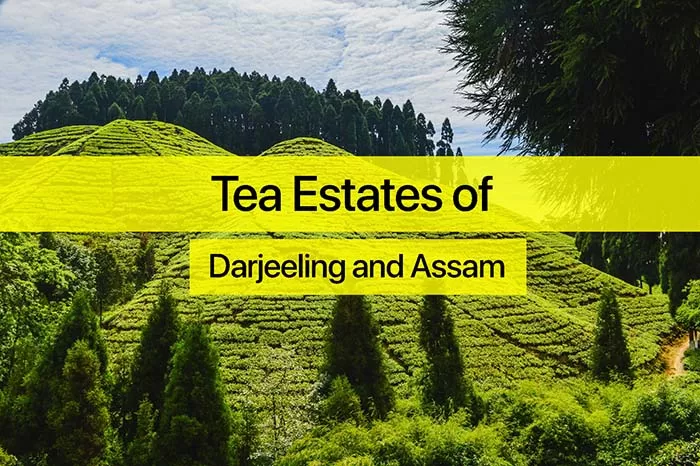
0 Comments